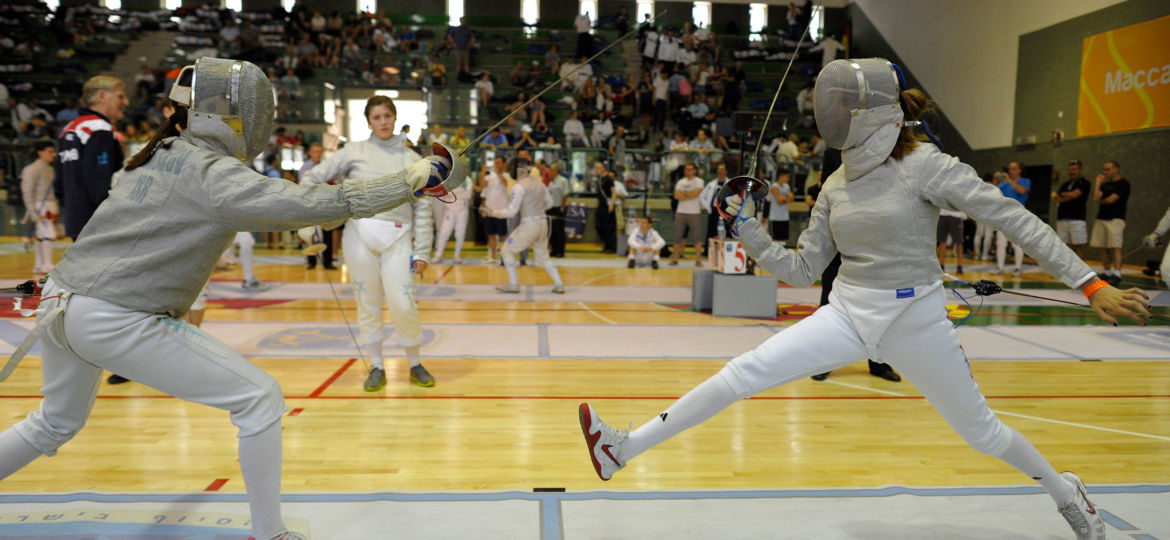
Written By Dylan Manfre
Sarah Lurye did not attend a Jewish high school growing up and wanted to find a way to make friends of a similar background. She discovered her Jewish community when she took up the sport of fencing.
Crowded fencing convention centers are commonplace, but to the 20-year-old’s surprise, a larger number of attendees at these events were Jewish like her.
“It turns out that fencing has historically been a very Jewish sport,” Lurye said. “For me, the sport became a way to make new Jewish friends and meet members of many different Jewish communities through the country and the world.”
The Maccabi USA open division epee fencer is excited to compete in the Maccabiah (ma-cobb-ee-ah) after she missed the opportunity in 2017 because of conflicting schedules between the games and the USA summer nationals competition in Salt Lake City. The rising junior at Duke University has been to Israel before but not for something this grand with more than 10,000 athletes participating.
“I hope to meet so many new incredible people, to see Israel in a different light, to see so many people celebrating Jewish people in sports,” Lurye said. “I’m just excited to go.”
Every four years fencing gets its international glorification on the world stage through the summer Olympics and the Maccabiah. About 10 nations will be sending delegations to compete in the blade-wielding sport in mid-July.
Fencing has deep ties with European Judaism dating back to World War II. The Jewish people used fencing during the war to combat discrimination and antisemitism. It provided them with a sense of togetherness during a time when the Holocaust stripped so many of so much.
Tablet Magazine published an article in 2019 that stated, “Jewish athletes have won more Olympic medals for fencing than any other sport.” It highlighted the accomplishments of Helen Mayer. According to the story, the Nazi regime classified her as fully Jewish although she was born half Jewish.
Mayer won the German women’s foil championship when she was 13 years old in 1924 and became a decorated fencer throughout the 20th century.
Maccabi USA’s open division head coach Oleg Brusilovsky was born in the former Soviet Union and, like Lurye, discovered large groups of Jewish coaches and athletes who participated in the sport he loved which helped cultivate a community.
“I think (fencing) is very tactical, very cerebral. It’s a very intellectual sport,” Brusilovsky said in a Ukrainian accent. “This is what, I think … attracts the Jewish people because I think we’re attracted to more of intellectual things.”
Master’s division foil fencer Philippe Bennett echoed a similar sentiment to Brusilovsky when he said Jewish people have gravitated toward fencing for generations.
When Brusilovsky coached at fencing schools in the Soviet Union, he believed “50% of the people were of Jewish origin.”
Back then, success came at a price and the Jewish people did not get a “free pass” for winning. Brusilovsky viewed his Judaism as “a liability” living in the Soviet Union. He won the Soviet national championship, but then was denied a spot on the world championship team. He believed the exclusion was because of his Jewish heritage.
“Antisemitism in (the) former Soviet Union was something to recon for,” he said.
In the upcoming Maccabiah, the opportunity to feel a sense of pride and celebration about being Jewish will be at the forefront of the competition. And Brusilovsky feels that message is important for him to convey to his athletes since he felt discriminated against for so long while competing.
“Now, it’s given me a chance to represent (the) United States in the upcoming game and really celebrate my origin as a Jewish person,” Brusilovsky said. “It’s extremely important to me.”
Bennett is a member of Maccabi USA’s Master (60-69) fencing division and participating in his third Maccabiah. The same feelings of Jewish pride through fencing and the desire to support Israel are what motivates him to continue competing.
“The beauty of the games is that you’re not a minority,” Bennett said. “What that does is it gives you a sense of harmony with the overall world you live in. It’s more than community, it’s that you feel that you’re part of something bigger.”
That is what Bennett and Lurye are looking forward to when they experience the opening ceremony in Jerusalem on July 14.
Dylan Manfre is a recent graduate of Rider University and an incoming graduate student at the University of Maryland. Follow him on Twitter (@Dylan_Manfre11) and on Instagram (@ByDylanManfre)
